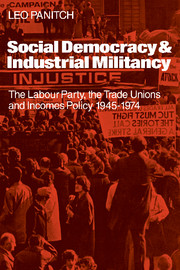 Social Democracy and Industrial Militiancy
Social Democracy and Industrial Militiancy Book contents
- Frontmatter
- Contents
- Preface
- List of Abbreviations
- Introduction
- 1 The 1945 Labour Government: the mixed economy and wage restraint
- 2 Incomes policy and Labour in opposition
- 3 The voluntary incomes policy agreement
- 4 The devaluation of voluntarism
- 5 The politics of wage freeze
- 6 The statutory incomes policy – Labour Government versus labour movement
- 7 ‘In place of strife’
- 8 Industrial militancy and political stagnation
- Conclusion
- Appendixes
- Notes
- Index
- Frontmatter
- Contents
- Preface
- List of Abbreviations
- Introduction
- 1 The 1945 Labour Government: the mixed economy and wage restraint
- 2 Incomes policy and Labour in opposition
- 3 The voluntary incomes policy agreement
- 4 The devaluation of voluntarism
- 5 The politics of wage freeze
- 6 The statutory incomes policy – Labour Government versus labour movement
- 7 ‘In place of strife’
- 8 Industrial militancy and political stagnation
- Conclusion
- Appendixes
- Notes
- Index
Summary
This study of the Labour Party's relationship with the trade union movement since 1945 has endeavoured to show the extent to which the Labour Party has performed the functions of an integrative party in the British political system. The integrative element of its ideology, while by no means ubiquitous throughout the Party, has had its concrete expression in the economic and industrial policies of Labour governments, suggesting that this is in fact the effective and dominant ideology of the Labour Party. Labour's frame of reference is not primarily focused within the orbit of the working class's subordinate position in British society, involving questions of how to increase that class's solidarity, extend its economic and political power, defend it against loss of limited gains already made. These considerations are not absent from Labour's conception of its role, but they are confined within a national frame of reference – a concern for national unity shared in common with Britain's dominant classes – in which the aim of making the British economy viable is paramount. It is, to quote Tom Nairn, the ‘nationalization of class’, from which Labour, wearing the twin hats of both national and class leadership, presumes to claim that its national concerns embrace the needs of the working class as well.
- Type
- Chapter
- Information
- Social Democracy and Industrial MilitiancyThe Labour Party, the Trade Unions and Incomes Policy, 1945–1947, pp. 235 - 259Publisher: Cambridge University PressPrint publication year: 1976


